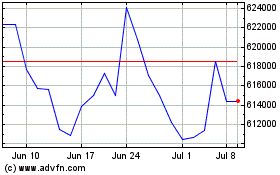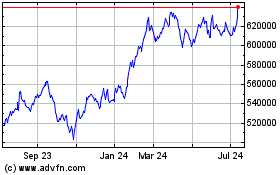By Nicole Friedman
This article is being republished as part of our daily
reproduction of WSJ.com articles that also appeared in the U.S.
print edition of The Wall Street Journal (May 6, 2019).
OMAHA, Neb. -- The two men most likely to succeed Warren Buffett
as chief executive of Berkshire Hathaway Inc. took their turns in
the spotlight at the company's annual meeting Saturday.
Mr. Buffett turned over some questions about Berkshire's
business operations to his two lieutenants, Ajit Jain and Greg
Abel, in a sign of their growing influence at the firm. Both men
rarely speak publicly, but shareholders have increasingly asked to
hear from them more.
The future of Berkshire after Mr. Buffett's death has long been
hotly debated in the business world. The 88-year-old Mr. Buffett
built the conglomerate and investing giant over more than five
decades into one of the world's biggest companies.
Berkshire has generated massive returns for its shareholders in
its history. Recent new investments and missteps have raised
concerns among some investors about whether the company has grown
too big to outperform the market in the future. In the past decade,
Berkshire stock has risen 259%, compared with a 314% increase in
the S&P 500 including dividends.
Mr. Buffett and Berkshire Vice Chairman Charlie Munger assured
shareholders Saturday during an hourslong question-and-answer
session that the company's future was in good hands.
"I don't know whether we'll outperform the S&P 500 or not. I
know we'll behave with our shareholders' money exactly as we would
behave with our own money," Mr. Buffett said. "You cannot have two
better operating managers than Greg and Ajit."
Mr. Buffett, whose shrewd investments have earned him the
nickname "the Oracle of Omaha," is Berkshire's chairman, chief
executive officer and chief investment officer. Messrs. Jain and
Abel were promoted to vice chairmen in early 2018, and one of them
will take on the CEO job in the future. Mr. Jain oversees
Berkshire's day-to-day insurance operations, and Mr. Abel manages
the company's noninsurance businesses.
Mr. Jain answered questions Saturday about Berkshire's insurance
underwriting and how its Geico unit compares to its top competitor,
Progressive Corp. Mr. Abel discussed the energy business's future
investments and customer satisfaction at its utility in Nevada.
Their comments were greeted with applause.
Underwriting insurance for unusual risks is "more of an art than
a science," Mr. Jain said.
Messrs. Abel and Jain might join Messrs. Buffett and Munger on
stage at the annual meeting in future years, Mr. Buffett said.
Mr. Buffett defended Berkshire's record, saying that it is still
difficult to find ways to invest its $114 billion in cash but that
he is pleased with the company's recent deals.
Earlier this week, Berkshire invested $10 billion in Occidental
Petroleum Corp.'s bid to buy Anadarko Petroleum Corp. That deal
came together within days, Mr. Buffett said, after Bank of America
Chief Executive Brian Moynihan made the initial outreach to
Berkshire on Occidental's behalf.
"If somebody wants a lot of certain money for a deal, they've
seen I can get a call on Friday afternoon, they make a date with me
on Saturday and by Sunday it's done," he said. "They absolutely
know we have $10 billion and we're not going to tell them how to
structure their transaction and do anything else."
Mr. Buffett also stood behind Kraft Heinz Inc., one of its
biggest investments, despite recent problems at the company. Write
downs at Kraft Heinz weighed on Berkshire's performance in the
fourth quarter of 2018.
Berkshire and private-equity firm 3G Capital formed Kraft Heinz
when they merged their H.J. Heinz Co. with Kraft Foods Group Inc.
in 2015. Mr. Buffett said that he overpaid for Kraft in that
deal.
"Kraft Heinz is still doing very well operationally," he said.
But "you can turn any investment into a bad deal by paying too
much."
Berkshire said Saturday it swung to a first-quarter profit,
thanks in part to higher insurance-investment income.
But Berkshire's earnings excluded its share of earnings from its
27% stake in Kraft Heinz, because Kraft Heinz hasn't yet filed its
earnings with the Securities and Exchange Commission.
Berkshire reported first-quarter net earnings of $21.66 billion,
or $13,209 per class A share equivalent, from a loss of $1.14
billion, or $692 a share, in the year-earlier period. Last year's
first-quarter earnings swung to a loss due to unrealized investment
losses.
Operating earnings, which exclude some investment results, rose
to $5.56 billion from $5.29 billion in the year prior.
Berkshire bought back $1.7 billion of its own shares in the
first quarter, the company said. It changed its buyback policy last
year, and some shareholders have said they would like the company
to spend significantly more cash repurchasing its stock.
Over time, Berkshire could repurchase $100 billion in shares,
Mr. Buffett said at the meeting.
"I predict we will get more liberal in repurchasing shares," Mr.
Munger said, echoing Mr. Buffett.
The conglomerate runs a large insurance operation, as well as
railroad, utilities, industrial manufacturers and retailers. Its
holdings include recognizable names like Dairy Queen, Duracell,
Fruit of the Loom, Geico and See's Candies.
Berkshire's insurance business sits at the core of its
money-making machine. Insurance brings in billions of dollars of
"float," or upfront premiums that customers pay and that Berkshire
invests for its own gain. Berkshire also holds large stock
investments, including in Apple Inc. and Wells Fargo & Co.
Class A shares closed Friday at $327,765, up 7.1% for the
year.
Write to Nicole Friedman at nicole.friedman@wsj.com
(END) Dow Jones Newswires
May 06, 2019 02:47 ET (06:47 GMT)
Copyright (c) 2019 Dow Jones & Company, Inc.
Berkshire Hathaway (NYSE:BRK.A)
Historical Stock Chart
From Mar 2024 to Apr 2024

Berkshire Hathaway (NYSE:BRK.A)
Historical Stock Chart
From Apr 2023 to Apr 2024
